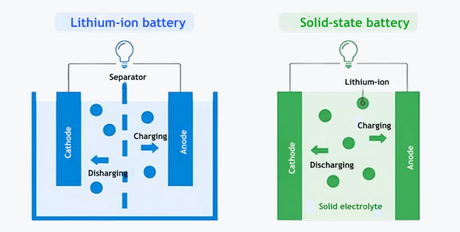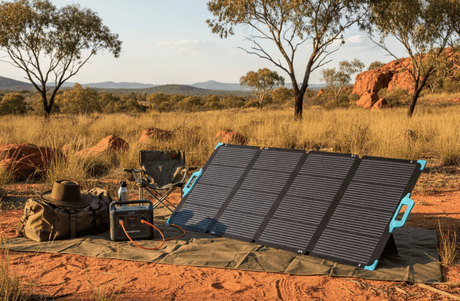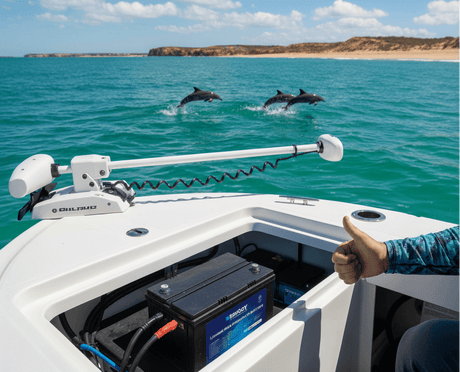For a long time, lithium-ion batteries were the ultimate solution for battery storage. They gave us more power and freedom than the old, heavy batteries. But now, there's talk about something new and even better: solid-state batteries.
You might be curious about these new batteries. Is this just a fancy idea, or will they make a difference in my house, RV, or boat?
Don't worry, it's simpler than it sounds. In this guide, we're going to look at solid-state vs. lithium-ion batteries side-by-side. We'll talk about which one is safer, which one lasts longer and which one powers your life better. Let's clear up the confusion and find out which battery is the right choice for your adventures.
What is a Lithium-Ion Battery?
A lithium battery uses a liquid electrolyte. This liquid is a special, organic solvent that allows lithium ions to shuttle back and forth between the anode and cathode. This movement creates the electrical current that powers everything from your phone to your residential solar system.
They store a lot of energy for their size and weight, last for many charge cycles, and are now produced affordably at a massive scale. For RVers and boaters, switching from heavy lead-acid to lithium-ion was a game-changer, offering more power without the weight.
What is a Solid State Battery?
A solid state battery does one thing radically different: it replaces the flammable liquid electrolyte with a solid material. This solid can be a special ceramic, glass, or polymer.
This single change—liquid to solid—is like replacing a shaky rope bridge with a solid steel beam. It might not sound like much, but it transforms the entire structure's potential, leading to huge differences in safety, performance, and longevity.
Solid-State vs. Lithium-Ion
Let's break down the comparison that matters most to you: solid state batteries vs lithium ion.
1. Safety
Lithium-Ion: The liquid electrolyte is highly flammable. If a battery is damaged, overcharged, or has an internal short circuit, it can enter "thermal runaway." This is a chain reaction that leads to intense, difficult-to-extinguish fires. This is a critical concern in the confined spaces of an RV or boat.
Solid-State: The solid electrolyte is non-flammable. It also physically prevents the growth of dendrites. This makes solid-state batteries inherently safer, drastically reducing the risk of fire. For a homeowner with a battery bank in their garage or a family on a boat, this safety advantage cannot be overstated.
2. Energy & Charging Speed
Solid-state batteries can potentially store double the energy in the same space as a lithium-ion battery. For you, this means an RV battery bank that could last two weeks off-grid instead of one, or a trolling motor battery that runs all weekend on a single charge.
Besides, due to ions can move more efficiently through a solid, solid-state batteries could recharge from 0% to 80% in a matter of minutes instead of hours.
3. Lifespan
How long do solid state batteries last? While exact numbers are still being proven, labs suggest they could last more than 10,000 charge cycles with minimal degradation. Even the best lithium-ion batteries typically max out around 5,000 cycles. This means a solid-state battery could last the lifetime of your RV or boat.
4. Temperature Sensitivity
When it comes to performance in extreme temperatures, the difference is significant. Lithium-ion batteries are notoriously sensitive to the cold. Their chemical reactions slow down, drastically reducing their ability to deliver power and accept a charge. This is why an EV's range can plummet in winter. They can also be dangerous in extreme heat, as high temperatures can accelerate degradation and increase the risk of thermal runaway.
Solid-state batteries, on the other hand, are far more stable. Their solid core performs reliably in both hot and cold conditions, offering consistent power and faster charging regardless of weather, making them ideal for the demanding environments faced by homeowners, boaters, and RVers.

Meet the Renogy Super Slim Lithium Iron Phosphate Battery right now! This battery delivers the essential features we expect, such as great safety, a very long lifespan, and consistent performance, in a impressively slim package.
It uses advanced LiFePO4 chemistry, which is inherently safer and more durable than traditional lithium batteries, giving you the confidence to power your home, RV, or boat without the worries of the past. If you're ready to improve your power system with a long-lasting battery, the future has already here.
FAQs About Solid State Batteries vs Lithium Ion
Does a solid state battery use lithium?
Yes! The name can be confusing. Both battery types use lithium. The "solid-state" refers to the electrolyte, not the lithium. The lithium is still the key ingredient that holds the charge.
Do solid-state batteries burn like lithium batteries?
No, solid-state batteries are fundamentally safer and far less likely to burn. The key reason lies in their core design. Traditional lithium-ion batteries contain a flammable liquid electrolyte. If this battery is damaged, overheated, or develops an internal short circuit, this liquid can ignite, leading to a dangerous and difficult-to-contain fire in a process called thermal runaway.
In contrast, solid-state batteries replace that volatile liquid with a stable, solid electrolyte made from materials like ceramic or polymer. This solid material is not flammable. Even if the battery is punctured, it won't leak a dangerous fluid, and the risk of a fire starting or spreading is drastically reduced.
Are solid-state batteries more eco-friendly?
They have strong potential to be more eco-friendly, but it's not a simple yes. The primary environmental advantage comes from longevity. Solid-state batteries are expected to last significantly longer—potentially double or more the lifespan of lithium-ion batteries. A battery that lasts for 15 years instead of 8 means fewer batteries need to be manufactured and disposed of over time, reducing waste and the overall environmental footprint.
Do solid-state batteries lose capacity?
Yes, all batteries lose capacity over time, but solid-state batteries degrade much more slowly. This gradual loss of ability to hold a full charge is called degradation. In lithium-ion batteries, degradation is accelerated by the breakdown of the liquid electrolyte and the growth of lithium spikes ("dendrites") that damage the battery's internal structure.
Solid-state technology tackles this problem at its root. The solid electrolyte is more chemically stable and physically suppresses the formation of dendrites. This results in a dramatically slower degradation process. While a lithium-ion battery might show significant capacity loss after a few thousand charges, a solid-state battery is expected to withstand many thousands more cycles with minimal degradation, making it a much more durable long-term investment.
Final Thoughts
For now, lithium-ion batteries might be your best bet. They are a proven, affordable, and powerful choice that will reliably run your home, RV, or boat for many years. The technology is mature, and you can buy with confidence.
The solid-state battery technology is the clear future. Its superior safety, incredible energy density, and blazing-fast charging will eventually redefine what's possible for off-grid and mobile living. Try it today and it won't let you down!









![What Is a DC to DC Battery Charger [Comprehensive Guide]](http://au.renogy.com/cdn/shop/articles/IMG_3829_bd86de74-31d6-49fd-b9d5-265bb723091d.jpg?v=1757582605&width=460)